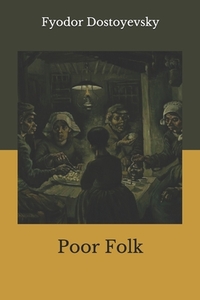Take a photo of a barcode or cover
An unbelievable amount of power for such a short novel. Some of the passages are heart breaking, particularly the story of the student. It's not flawless; the letter about the actress that parallels Varvara was clumsy, and the structure becomes quite loose towards the end. The characters and plot aren't as compelling as Crime and Punishment, but you can tell they were written by the same author, which is more than enough to make it worth the read.
It's a series of letters between two of the saddest people in the world. But hey, if you're a lady and you're wicked poor, there is always marriage! Because what is happiness anyway? Dude, Dostoevsky, you don't even have the "Heh, oh what passes for humanity!" pick-me-up of Chekhov, you just slap that serving of dour down like the thin gruel your characters are forced to eat. It is, again, a really involving and interesting story, but not like—heavy? If you feel like a light read and a dose of the sad, then there you go. At this point, I am feeling like reading Dostoevsky is a waste of my time, as I'm getting little out of it.
Young D.'s first splash, which I never read; I suppose I had it down as pre-arrest and gauche. I feel I've cheated because I've read the contextualisation of it in [b:Dostoevsky: The Seeds of Revolt, 1821-1849|434860|Dostoevsky The Seeds of Revolt, 1821-1849|Joseph Frank|https://d.gr-assets.com/books/1348019431s/434860.jpg|423793]; I suspect this one, unlike his later immortal works, doesn't exactly work without its context, since he does a few radical things here that you wouldn't be aware of unless you're up on your Russian and European history of novels. In brief -- I won't cheat again by going back to Frank, this is from memory -- the novel of letters was in fashion but about the upper classes; here he turns the format to a down-at-heels clerk and his impoverished girlfriend. In Russia, Gogol had written about a lowly clerk in The Overcoat, but remained in a 'look down and pity' perspective, instead of the inner life as seen from the inside, and with Gogol's satirical bent. So, Poor Folk was the first in Russia to treat these poor of Petersburg in the manner that he does, and he uses the tropes of the sentimental novel to do so. It's funny when his clerk reads excerpts from a send-up of these sentimental novels, about the upper classes, without himself having the temerity to think, what we the readers notice, that his own sentiments are more fine and genuine than those in this 'fine literature'. At the time D. was under the influence of the French Socialist writers, Victor Hugo and George Sand with her novels about the noble poor.
Anyhow, its history aside, I enjoyed this more than expected; it was a tear-jerker and a spoof, and self-referential, with satire of the writers of the day; and his observations about overcoats are an attempt to deepen Gogol: add psychology, says Dostoyesky.
Anyhow, its history aside, I enjoyed this more than expected; it was a tear-jerker and a spoof, and self-referential, with satire of the writers of the day; and his observations about overcoats are an attempt to deepen Gogol: add psychology, says Dostoyesky.


